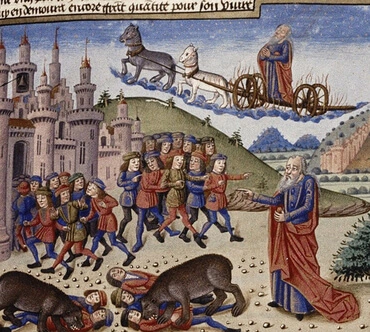1
Og da de hadde brukt op det korn de hadde hentet fra Egypten, sa deres far til dem: Dra atter avsted og kjøp oss litt korn!
2
Men Juda sa til ham: Mannen sa så alvorlig til oss: I skal ikke komme for mine øine uten eders bror er med.
3
Dersom du vil sende vår bror med oss, vil vi dra ned og kjøpe korn til dig.
4
Men dersom du ikke vil sende ham, vil vi ikke dra ned; for mannen sa til oss: I skal ikke komme for mine øine uten eders bror er med.
5
Da sa Israel: Hvorfor har I gjort så ille mot mig og fortalt mannen at I har ennu en bror?
6
De svarte: Mannen spurte oss nøie ut både om oss og om vår ætt og sa: Lever eders far ennu? Har I nogen bror? Og vi svarte ham efter som han spurte; kunde vi vel vite at han vilde si: Kom her ned med eders bror?
7
Og Juda sa til Israel, sin far: Send gutten med mig I Så vil vi gjøre oss rede og dra avsted, så vi kan leve og ikke skal dø, både vi og du og våre små barn.
8
Jeg skal svare for ham, av mig kan du kreve ham; dersom jeg ikke har ham med tilbake til dig og stiller ham for ditt ansikt, da vil jeg være din skyldner alle mine dager;
9
for dersom vi ikke hadde dryget så lenge, da kunde vi nu to ganger vært her igjen.
10
Da sa Israel, deres far, til dem: Skal det nu så være, så gjør som jeg sier: Ta i eders sekker av alt det ypperste landet eier, og ha det med til mannen som gave, litt balsam og litt honning, krydderier og ladanum, pistasienøtter og mandler,
11
og ta dobbelt så mange penger med eder, for de penger som kom igjen og lå øverst i eders sekker, må I ha med tilbake; kanskje det var en feiltagelse.
12
Ta så eders bror med, og gjør eder rede og dra tilbake til mannen!
13
Og den allmektige Gud la eder finne barmhjertighet hos mannen, så han lar eders andre bror og Benjamin dra hjem igjen med eder; og jeg - skal jeg være barnløs, så får jeg være barnløs!
14
Så tok mennene denne gave, og de tok dobbelte penger med sig, og Benjamin; og de gjorde sig rede og drog ned til Egypten og trådte frem for Josef.
15
Da Josef så Benjamin sammen med dem, sa han til den som forestod hans hus: Før mennene inn i huset og la slakte og lage til; for mennene skal ete til middag hos mig.
16
Og mannen gjorde som Josef sa, og førte mennene inn i Josefs hus.
17
Men mennene blev redde fordi de blev ført inn i Josefs hus, og de sa: Det er vel for de pengers skyld som forrige gang kom tilbake i våre sekker, vi føres inn her, forat han kan velte sig inn på oss og kaste sig over oss og gjøre oss til træler og ta våre asener.
18
De gikk derfor til mannen som forestod Josefs hus, og talte til ham ved inngangen til huset
19
og sa: Hør, herre! Vi kom forrige gang ned her for å kjøpe korn;
20
men da vi kom til herberget og åpnet våre sekker, se, da lå enhvers penger øverst i hans sekk, våre penger med sin fulle vekt, og nu har vi dem med oss igjen,
21
og vi har tatt andre penger ned med oss til å kjøpe korn for; vi vet ikke hvem som har lagt våre penger i våre sekker.
22
Da sa han: I kan være rolige, frykt ikke! Eders Gud og eders fars Gud har gitt eder en skatt i eders sekker; eders penger har jeg fått. Så førte han Simeon ut til dem.
23
Derefter førte mannen dem inn i Josefs hus og gav dem vann, og de tvettet sine føtter, og han gav dem fôr til deres asener.
24
Så la de gaven til rette til Josef skulde komme hjem om middagen; for de hadde hørt at de skulde ete der.
25
Og da Josef var kommet hjem, bar de inn til ham gaven som de hadde med sig, og kastet sig ned på jorden for ham.
26
Men han spurte dem om det gikk dem vel, og han sa: Går det eders far vel, den gamle som I talte om? Lever han ennu?
27
De svarte: Ja! Det går din tjener vår far vel; han lever ennu. Og de bøide sig og kastet sig ned for ham.
28
Og da han så op og fikk øie på Benjamin, sin bror, sin mors sønn, sa han: Er dette eders yngste bror, som I talte til mig om? Og han sa: Gud velsigne dig, min sønn!
29
Og Josef skyndte sig bort, for hans hjerte brente mot hans bror, og han søkte et sted hvor han kunde gråte; og han gikk inn i sitt kammer og gråt der.
30
Så tvettet han sitt ansikt og gikk ut, og han gjorde sig sterk og sa: Sett maten frem!
31
Og de satte frem for ham særskilt og for dem særskilt, og for egypterne som åt hos ham, særskilt; for egypterne kan ikke ete sammen med hebreerne, det er en vederstyggelighet for egypterne.
32
Og mennene fikk sine plasser midt imot ham efter alderen, den førstefødte øverst og den yngste nederst, og de så på hverandre og undret sig.
33
Og han lot bære til dem av maten på sitt bord, og Benjamin fikk fem ganger så meget som enhver av de andre; og de drakk, og drakk sig glade med ham.







